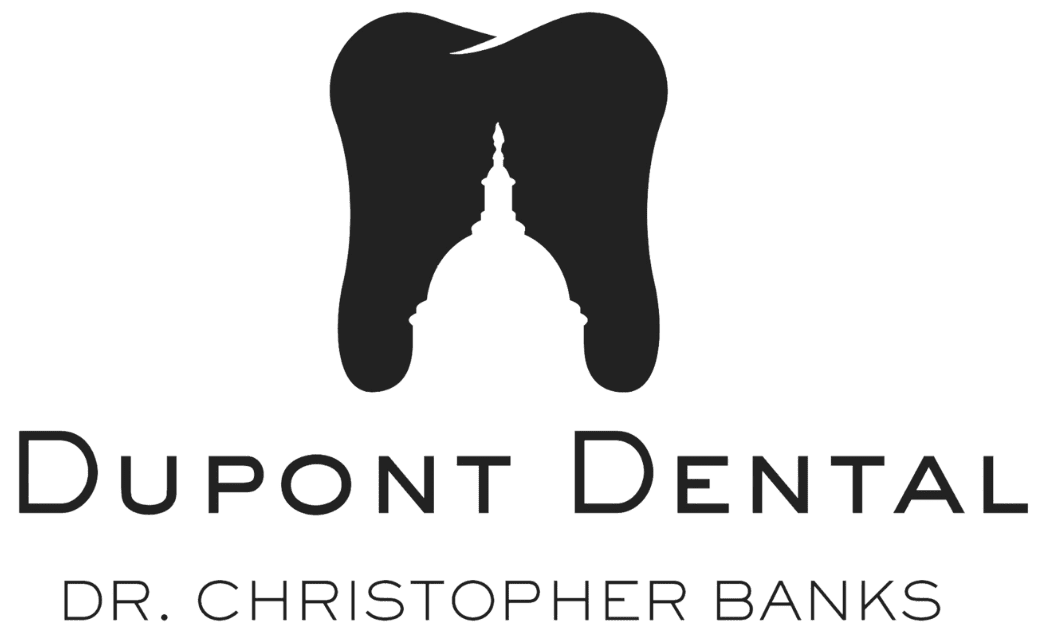Do your gums bleed when you brush your teeth? Are your gums sensitive to cold foods and drinks? You may have gingivitis. While gingivitis, or gum inflammation, is easily reversible, it can develop into a problem that can be more difficult to eliminate: gum disease. At Dupont Dental, we offer periodontal disease treatment in our Washington, DC, dental office for patients to restore gum health.
Gum disease, or periodontitis, is a common but highly damaging dental problem that requires professional care. Professional care from Dr. Christopher Banks can keep gum disease symptoms in check. Our office also offers additional restorative dentistry services in our DC office.

Gum Disease Symptoms and Risk Factors
The early stages of gum disease are subtle. Many people don’t realize they have a problem until it gets worse. That’s why you should pay attention to any changes in your mouth and visit our dentist regularly. The most common signs of gum disease include:
- Bleeding gums
- Sensitive gums
- Bad breath
- Gum recession
- Deep gum pockets
- Loose teeth
Multiple factors can increase your risk of gum disease:
- Age
- Genetics
- Diabetes
- Heart disease
- Smoking and tobacco use
- Poor oral hygiene
If you notice these signs of gum disease and have one or more of these risk factors, please contact our office. Dr. Banks will perform a visual exam and take digital X-rays. Let us know about all your symptoms to help us determine the right treatment for your stage of gum disease.
Stages of Gum Disease
Gum disease is a serious oral health problem that gets worse over time if it’s not treated. Knowing the signs can help you get the right care before it causes lasting damage. Gum disease has four main stages.
Gingivitis
This is the only reversible “stage” of gum disease, also known as gum inflammation. When harmful bacteria begin to build on the gums, they irritate and inflame the tissue. Your gums can feel sensitive and bleed when you brush and floss. The best ways to treat gingivitis are through routine dental cleanings and regular brushing and flossing at home.
Mild Periodontitis
As gum inflammation becomes gum disease, your gums will begin to pull away from your teeth. This process will create bacteria-filled gum pockets. You may need regular deep gum cleanings to treat these pockets.
Moderate Periodontitis
As the disease progresses, the pockets around your teeth become deeper, and the gum infection spreads. More gum tissue is destroyed, and the damage becomes harder to treat. You may start to feel pain, soreness, or bleeding in your gums more often. At this stage, your dentist may need to use more advanced treatments to clean the infected areas and help save your teeth.
Advanced Periodontitis
This is the most serious stage of gum disease. By now, the infection has caused major damage to your gums and the bone that supports your teeth. Your teeth may feel loose or even fall out. At this stage, you need surgery to clean deep areas of infection, rebuild lost tissue, or remove teeth that cannot be saved. Without treatment, you risk permanent tooth loss and serious health problems.
Gum Disease and Your Health
Gum disease doesn’t just affect your mouth, it can also impact your overall health. When you have gum disease, harmful bacteria cause your gums to become red, swollen, and inflamed. If you don’t treat the infection, the bacteria and inflammation can spread into your bloodstream. This can lead to serious health problems, especially for people with other medical conditions.
Heart Disease
People with heart disease should be especially careful. Gum disease can raise the risk of heart attacks, strokes, and other heart-related problems. The bacteria from your gums may travel through your blood and cause more inflammation in the heart.
Diabetes
Diabetes is another condition that’s closely linked to gum disease. If you have high blood sugar, it can make it easier for bacteria to grow in your mouth. This makes it harder for your body to fight infections, including those in your gums. But having gum disease can also make it harder to control your blood sugar levels.
Pregnancy
Pregnant women also need to pay attention to their gum health. Hormone changes during pregnancy can make the gums more sensitive and more likely to bleed or swell. This is called pregnancy gingivitis. It’s safe to have a dental cleaning during the second trimester of pregnancy. Regular dental care during this time can help prevent gum problems.
Periodontal Disease Treatment at Dupont Dental
You can reverse gingivitis with good daily oral care at home and regular professional dental cleanings. But once gingivitis turns into gum disease, you need professional care to save the teeth and gums. We provide multiple periodontal disease treatment options in Washington, DC.
Scaling and Root Planing
We use these deep cleaning treatments to remove the tartar and plaque from the gums and root surfaces. During scaling, we remove bacterial buildup from the gums and beneath the gum line. Then, we perform root planing treatment. We remove bacterial buildup from the roots and smooth the surface of the tooth roots, which can become rough when bacteria attach to them. Our office uses these techniques together to keep the tooth roots attached to the gums.
We can also place antibiotics in the gum pocket to help kill the harmful bacteria and prevent reinfection. Eventually, the gums heal and then reattach to the clean surfaces of your teeth. If you have gum disease symptoms that keep coming back, we’ll make a schedule for you to get regular deep gum cleanings. Dr. Banks may recommend gum cleanings every 3 to 4 months.
Restorative Care
When gum disease becomes severe, it can lead to permanent tooth loss. The harmful bacteria in your mouth can damage the gum tissue and cause it to pull away from your teeth. This is called gum recession. Over time, the teeth can become loose and eventually fall out or need to be removed.
If you’ve lost teeth from gum disease, you don’t have to live with an incomplete smile. Once your gums and mouth are healthy enough, we can begin treatment to restore your missing teeth. One of the best options for tooth replacement is dental implants. Implants are considered the gold standard because they look, feel, and work like natural teeth.
If you’re missing just one tooth, we may recommend a single dental implant. For patients who are missing several or all their teeth, we may recommend a dental bridge or dentures that are supported by dental implants.
Oral Surgery
You’ll need surgery if you have advanced gum disease. Some surgeries can remove the diseased gum tissue. Treatments like gum grafting can add healthy gum tissue over deep gum pockets. We may also need to perform a tooth extraction if we can’t save your loose teeth. We’ll refer you to a periodontist to perform gum surgery if needed.
Patient Review
Frequently Asked Questions
Do you have more questions? We welcome you to learn more about gum disease. Read answers to these common questions about periodontal disease treatment in our Washington, DC, dental office.
Does gum disease treatment hurt?
Anesthesia is common in gum disease treatments for pain-free care. However, sensitivity is common when you already have sensitive gum tissue because of an infection. You may have sensitive gum tissue after a deep cleaning, but this will fade. After you tackle gum disease, you will no longer feel gum pain or discomfort.
Will gum disease go away on its own?
No, gum disease will not stop on its own. If left untreated, gum disease will progress. Thorough brushing and flossing can help reverse gum inflammation. However, if you develop gum disease, you need professional dental care. Scaling and root planing, restorative care, and even surgery can treat your gum disease.
Can the gums grow back naturally?
No, once your gums recede, they will not grow back. Grafting is your best option to restore healthy gums if you have gum recession. For this reason, care for your gum health at home with regular brushing and flossing. If you notice changes in your gum health, call our dentist office for professional care.
How often should I get a deep cleaning if I have gum disease?
If you have gum disease, you’ll likely need a deep cleaning (scaling and root planing) at least once every 6 to 12 months. In more severe cases, we may recommend cleanings more frequently, sometimes every 3 to 4 months, to effectively manage the disease. Regular deep cleanings keep your gums healthy and prevent further damage. Dr. Banks will create a personalized schedule based on your condition and monitor your progress closely.
What happens if I decide not to treat my gum disease?
Untreated gum disease worsens over time, leading to significant issues like gum recession, tooth sensitivity, infections, bone loss, and eventually tooth loss. Beyond oral health, chronic gum disease increases your risk for other serious conditions, such as heart disease and diabetes.
You want to treat gum problems early to stop them from getting worse. Don’t ignore the signs. Visiting Dr. Banks regularly and getting care quickly can help protect your health.
Will I eventually lose my teeth if I have gum disease?
Not necessarily. If you treat gum disease early, you can save your teeth and gums. However, untreated or advanced gum disease can severely damage gums and bone, eventually causing teeth to become loose and fall out. Most people can keep their natural teeth even after a gum disease diagnosis with timely intervention, consistent oral care, and professional support.
Are electric toothbrushes better for preventing gum disease?
Electric toothbrushes remove more plaque with their consistent motion, and built-in timers ensure you brush long enough. Studies show electric toothbrushes can reduce gingivitis by about 11% more than manual brushing. The pressure sensors also help prevent the aggressive brushing that often damages gums.
But that doesn’t mean a manual toothbrush is bad. You can still keep your teeth and gums healthy with a manual toothbrush as long as you brush the right way. Brush gently in small circles, use a soft-bristled brush, and take your time. Whether you choose an electric or manual brush, what matters most is brushing twice a day and flossing daily.
Restore Your Gum Health
Are you noticing changes in your gum health like bleeding, swollen, or red gums? Call Dupont Dental for periodontal disease treatment in Washington, DC, at (202) 946-4720. You can also schedule a gum disease consultation with Dr. Banks online.
If you have more questions about your gum health, let us know at your next appointment. We’re here to help improve your health.
